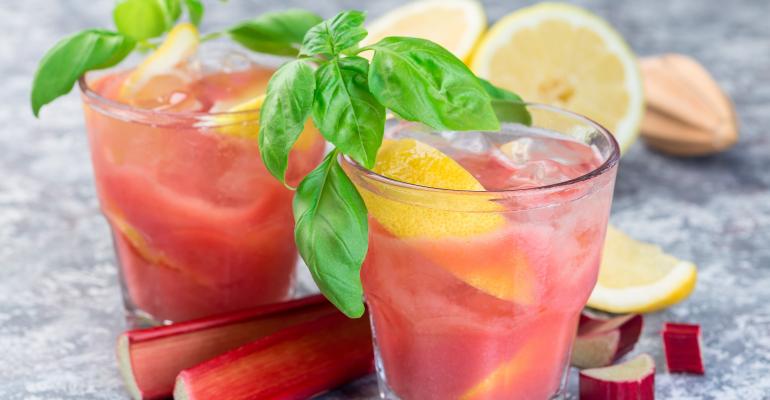Sponsored by Monin®
How do you re-energize beverage sales in a restaurant during pandemic recovery? A good way is to promote a list of specialty cocktails and low ABV/alcohol-free drinks with on-trend flavors and ingredients.
Consumers are chomping at the bit to return to restaurants and resume the global flavor exploration curtailed by the pandemic. When it comes to imbibing, specialty cocktails made with premium spirits and local and seasonal ingredients are high on their wish lists.
The notion of flavoring drinks with fruits, vegetables, and herbs dovetais with consumers' trend of eating and drinking more healthfully. Products that were on the fringe of popularity not long ago, such as non-dairy milk alternatives and plant-based burgers, have zoomed into the mainstream in recent years.
This mindfulness was apparent well before the pandemic struck, and research suggests that it will continue. According to the State of Flavor in America Report, nearly three-quarters (72%) of Americans say they plan to eat healthier in 2021 and nearly half (47%) will incorporate more plant-based foods in their diets DoorDash.
True, original experiences
Drinks with clean, local, seasonal ingredients strike a chord with patrons today.“That may not be the 'be-all, end-all' for people, but it matters,” says Jeremiah Duncan, general manager and beverage director of Wood, an upscale-casual restaurant in Chicago.
In fact, signature cocktails with those attributes served with such creative dishes as Cauliflower Steak Au Poivre and Rabbit Rillette Toast, keep the Wood dining room regularly filled to 50% capacity, the maximum indoor seating that city regulations currently permit.
After months of at-home mixology, customers are more than ready to hand the reins back to professionals. “People are really craving the true, original experiences that are usually found only at restaurants and bars like ours,” says Duncan.
Catching their fancy are signature drinks that cast fruit and vegetable juices, purees, syrups, and herbs in strong supporting roles with premium spirits. A popular example is the Seersucker, a medley of mezcal, reposado tequila, organic beet juice, lemon, and simple syrup, garnished with fresh rosemary.
Riffing on the margarita theme of agave-based spirits and citrus, the Seersucker bolsters tequila with smoky mezcal, substitutes lemon for lime for extra brightness, and creates “a beautiful earthy punch” and a “neon maroon” color with the organic beet juice, says Duncan.
Another of his signature creations, The Last Sunset on Earth, combines premium gin, caramelized pineapple, elderflower liqueur, bitter Italian aperitivo, yuzu, lemongrass, French dry vermouth, and rosewater mist to arrive at “balanced, exotic flavors,” he says.
“This is certainly a drink that leans to the complex side,” adds Duncan. “It probably took 19 different versions to get it right.”
Actually, the drink requires less labor at the bar than it may appear at first glance. The kitchen crew makes the caramelized pineapple and the yuzu is a convenient prepared product. “Some small cocktail bars might consider that cutting corners,” says Duncan. “But I don't see it that way if it’s a quality product that creates a beautiful result and allows me time for other important things.”
Other operators may have reason to use prepared syrups and purees at the bar to avoid the potential quality variations, supply interruptions, inconsistencies, and fluctuating prices of fresh fruits.
Making up for lost time
Specialty cocktails are part of the recovery effort at The Lobby Bar of the Quirk Hotel in Richmond, Virginia. “I would say consumer confidence is at least 60% back,” says Morgan Slade, director of food and beverage. “We’re having some busy weekends.”
Patrons are making up for a year of missed festivity. “That's part of the driving force—they want these cocktails again,” says Slade. One they enjoy is the Q G+T, “a proper gin tonic,” as Slade puts it, upgraded with fresh rosemary, juniper berries, and thyme along with premium English gin and Indian tonic water. Slade notes that it goes well with The Lobby Bar’s rustic American craft cuisine, which draws flavor inspirations from as far as the Mediterranean and Africa. Another signature is the Q75, a twist on the French 75 cocktail that combines gin and sparkling wine with crème de mûre, a blackberry liqueur, and thyme. Also in play at the bar are flavorful elements such as apple cider syrup and infusions of herbs, lavender, and Earl Grey tea.
Welcoming customers back to the bar and dining room is a priority for restaurant operators as pandemic recovery edges forward. One of the most effective ways to create excitement and regular patronage is to promote specialty cocktails and alcohol-free beverages with creative, vibrant flavors.





